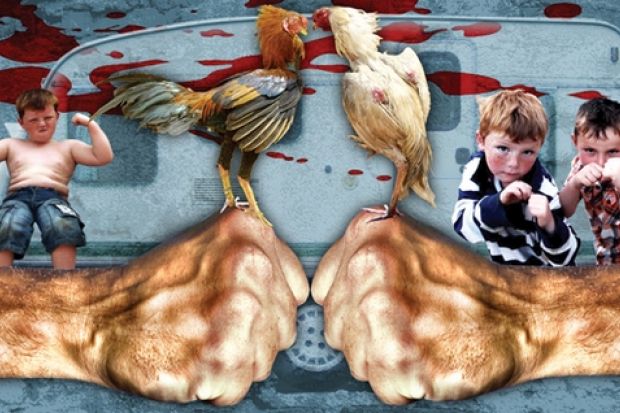Gypsies have had a bad press. They are seen as dirty, criminal and work-shy. Leo Maguire's debut documentary should go some way towards correcting that impression (Gypsy Blood: True Stories, Channel 4, Thursday 19 January, 10pm). This was not viewing for the faint-hearted. We saw a roe mauled to death, a rabbit ripped open and a turkey shot through the head with an air rifle. A minute later, its claws were still opening and closing.
But what looked like brutality was nothing of the sort. The roe and the rabbit were killed for food. Recoiling from the sight shows that we have forgotten how meat arrives on our plates. The turkey was dispatched because it was suffering. "Poor thing," said the man who pulled the trigger.
The cockfight was a different matter. Those watching shouted encouragement. "Go on, kill him, you cunt!" "Finish him off!" The defeated bird hung its head, panting, the light fading from its eyes.
Leading the charge was Fred. He was introduced snoring on a sofa while a friend, or it could have been a family member, gave us an insight into his character. "He's a raving lunatic. If you hit him, you won't hurt him, you will just upset him." Michael, another friend or family member, recalled taking Fred to church. The visit was not a success. For reasons unknown, Fred had threatened to kill the priest. The man himself joked that God wouldn't want him in Heaven as he would take the place over.
Fred is head of the Butcher family, Hughie the head of the Doherty family. Like Fred, it is not advisable to argue with Hughie. One man did. He soon had cause to regret it. Hughie demanded retribution. The man asked if they could wear gloves. Hughie was outraged. Gloves! The man crumbled inside and sent his brother to fight in his place. Once he's recovered from the blow that knocked him over, he'll probably have a few words to say to his younger sibling. The fight was captured on cameraphone so that Hughie's family could watch it later.
Hughie's philosophy is that you don't look for trouble but, equally, you don't let anyone be rude to you, insult you or walk all over you. If they do, you must settle the matter with your fists. The opening shots were a montage of burly men, stripped to the waist, squaring up to each other. Each fight is refereed and if anyone breaks the rules, victory goes to his opponent. We don't sue, or take people to court, said Fred. We sort it out like men. This was definitely a male culture. Angela, Hughie's sister, reiterated the prevailing view: "He doesn't go looking for trouble, but..." It's funny how the people who say they aren't looking for trouble are the ones who get into it the most.
Maybe they enjoy it. That's certainly the impression Hughie gives. His life seems to revolve around punch-ups. They are a source of pride, of tradition; they are part of who he is. "If my son couldn't fight, I'd give him a DNA test," said Hughie. He was teaching his seven-year-old the same things that his father had taught him: that you must never run away and that you must never give up.
Fred said that people would talk about a good scrap for years. They became part of folklore. After an epic confrontation in 1952, Fred's grandfather had to have his hand amputated. The resulting hook did not make him any less formidable.
Fist-fighting has a certain integrity. It requires skill and bravery and, win or lose, it's a way of earning respect. "You're a game man," said Hughie to his felled opponent. But what if the person who had been rude or insulting triumphed in the slug-out? Would that put an end to the quarrel or prolong it? Fred was set upon by members of a rival clan armed with machetes and baseball bats. He dreams of revenge. This is a society that lives by the feud.
Any internal conflict can only be exacerbated by pressures from the outside world. And they are many. In 1994, the Tories repealed legislation obliging local councils to provide sites for travellers. That was part of the problem behind the notorious Dale Farm eviction last year. A 2006 study found that the most widespread racism was against Gypsies. Shops still put up notices saying "no travellers". Gypsies suffer the fate of all outsiders, becoming a focus for all our fears and anxieties, a scapegoat on to which we project our own ills.
Maguire's documentary showed them as they see themselves: fierce, proud and unsentimental. The men may bloody one another's noses, but there are many kinds of violence. Cuts, unemployment, homelessness. At least Gypsies believe in a fair fight.
Register to continue
Why register?
- Registration is free and only takes a moment
- Once registered, you can read 3 articles a month
- Sign up for our newsletter
Subscribe
Or subscribe for unlimited access to:
- Unlimited access to news, views, insights & reviews
- Digital editions
- Digital access to THE’s university and college rankings analysis
Already registered or a current subscriber? Login
